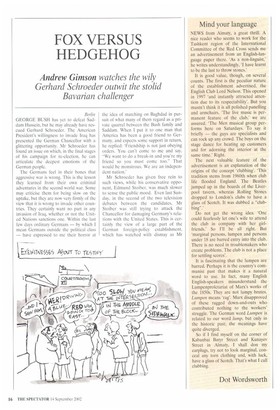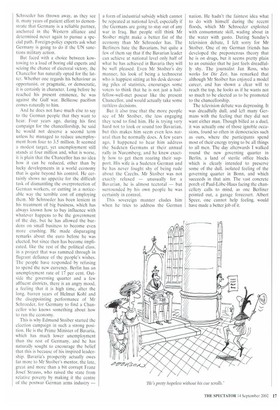FOX VERSUS HEDGEHOG
Andrew Gimson watches the wily
Gerhard Schroeder outwit the stolid Bavarian challenger
Berlin GEORGE BUSH has yet to defeat Saddam Hussein, but he may already have rescued Gerhard Schroeder. The American President's willingness to invade Iraq has presented the German Chancellor with a glittering opportunity. Mr Schroeder has found an issue on which, in the final stages of his campaign for re-election, he can articulate the deepest emotions of the German people.
The Germans feel in their bones that aggressive war is wrong. This is the lesson they learned from their own criminal adventures in the second world war. Some may criticise them for being slow on the uptake, but they are now very firmly of the view that it is wrong to invade other countries. They certainly want no part in any invasion of Iraq, whether or not the United Nations sanctions one. Within the last few days ordinary Germans — by which I mean Germans outside the political class — have expressed to me their horror at the idea of marching on Baghdad in pursuit of what many of them regard as a private quarrel between the Bush family and Saddam. When I put it to one man that America has been a good friend to Germany, and expects some support in return, he replied: 'Friendship is not just obeying orders. You can't come to me and say, "We want to do a break-in and you're my friend so you must come too." That would be monstrous. We are an independent nation.'
Mr Schroeder has given free rein to such views, while his conservative opponent, Edmund Stoiber, was much slower to sense the public mood. Even last Sunday, in the second of the two television debates between the candidates, Mr Stoiber was still trying to attack the Chancellor for damaging Germany's relations with the United States. This is certainly the view of a large part of the German foreign-policy establishment, which has watched with dismay as Mr Schroeder has thrown away, as they see it, many years of patient effort to demonstrate that Germany is a reliable partner, anchored in the Western alliance and determined never again to pursue a special path. Foreign-policy experts ask what Germany is going to do if the UN sanctions military action.
But faced with a choice between kowtowing to a load of boring old experts and seizing the chance of electoral victory, the Chancellor has naturally opted for the latter. Whether one regards his behaviour as opportunist, or pragmatic, or democratic, it is certainly in character. Long before he reached his present eminence, he was against the Gulf war. Bellicose pacifism comes naturally to him.
And he does not have much else to say to the German people that they want to hear. Four years ago, during his first campaign for the chancellorship, he said he would not deserve a second term unless he managed to reduce unemployment from four to 3.5 million. It seemed a modest target, yet unemployment still stands at four million and, what is worse, it is plain that the Chancellor has no idea how it can be reduced, other than by lucky developments in a world economy that is quite beyond his control. He certainly shows no appetite for the difficult task of dismantling the overprotection of German workers, or cutting in a noticeable way the terrible cost of employing them. Mr Schroeder has been lenient in his treatment of big business, which has always known how to buy influence with whatever happens to be the government of the day, but he has allowed the burdens on small business to become even more crushing. He made disparaging remarks about the euro before he was elected, but since then has become implicated, like the rest of the political class, in a project that was rammed through in flagrant defiance of the people's wishes. The people have responded by refusing to spend the new currency. Berlin has an unemployment rate of 17 per cent. Outside the governing quarter and a few affluent districts, there is an angry mood, a feeling that it is high time, after the long, barren years of Helmut Kohl and the disappointing performance of Mr Schroeder, for Germany to find a Chancellor who knows something about how to run the economy.
This is why Edmund Stoiber started the election campaign in such a strong position. He is the Prime Minister of Bavaria, which has much lower unemployment than the rest of Germany, and he has naturally sought to encourage the belief that this is because of his inspired leadership. Bavaria's prosperity actually owes far more to Mr Stoiber's mentor, the late, great and more than a bit corrupt Franz Josef Strauss, who raised the state from relative poverty by making it the centre of the postwar German arms industry — a form of industrial subsidy which cannot be repeated at national level, especially if the Germans are going to stay out of any war in Iraq. But people still think Mr Stoiber might make a better fist of the economy than Mr Schroeder has. The Berliners hate the Bavarians, but quite a few of them say that if the Bavarian leader can achieve at national level only half of what he has achieved in Bavaria they will be well pleased. Even Mr Stoiber's dry manner, his look of being a technocrat who is happiest sitting at his desk devouring piles of statistics, encourages some voters to think that he is not just a hailfellow-well-met poseur like the present Chancellor, and would actually take some ruthless decisions.
But it also true that the more people see of Mr Stoiber, the less engaging they tend to find him. He is trying very hard not to look or sound too Bavarian, but this makes him seem even less natural than he normally does, A few years ago, I happened to hear him address the Sudeten Germans at their annual rally in Nuremberg, and he knew exactly how to get them roaring their support. His wife is a Sudeten German and he has never fought shy of being rude about the Czechs, Mr Stoiber was not exactly relaxed — unusually for a Bavarian, he is almost teetotal — but surrounded by his own people he was certainly in control.
This sovereign manner eludes him when he tries to address the German
nation. He hadn't the faintest idea what to do with himself during the recent floods, which Mr Schroeder exploited with consummate skill, wading about in the water with gusto. During Sunday's television debate, I felt sorry for Mr Stoiber. One of my German friends has developed the preposterous theory that he is on drugs, but it seems pretty plain to an outsider that he just feels dreadfully shy. The journalist Jan Ross, who works for Die Zeit, has remarked that although Mr Stoiber has enjoyed a model career, and has shown a clear will to reach the top, he looks as if he wants not so much to be elected as to be promoted to the chancellorship.
The television debate was depressing. It was dreadfully dull, and left many Germans with the feeling that they did not want either man. Though billed as a duel, it was actually one of those ignoble occasions, found so often in democracies such as ours, where the participants spend most of their energy trying to be all things to all men. The day afterwards I walked round the new governing quarter in Berlin, a land of sterile office blocks which is clearly intended to preserve some of the dull, isolated feeling of the governing quarter in Bonn, and which succeeds in that aim. The vast concrete porch of Paul-Labe-Haus facing the chancellery calls to mind, as one Berliner pointed out, a garage forecourt. Albert Speer, one cannot help feeling, would have made a better job of it.











































































 Previous page
Previous page